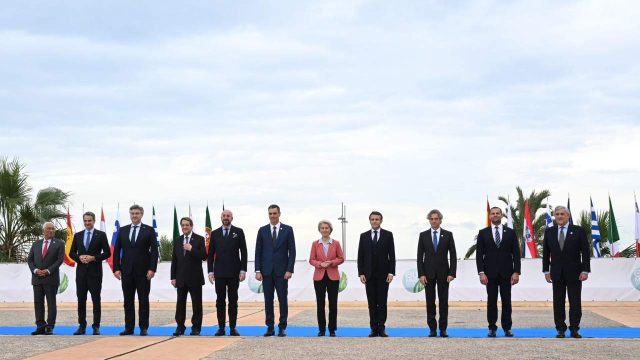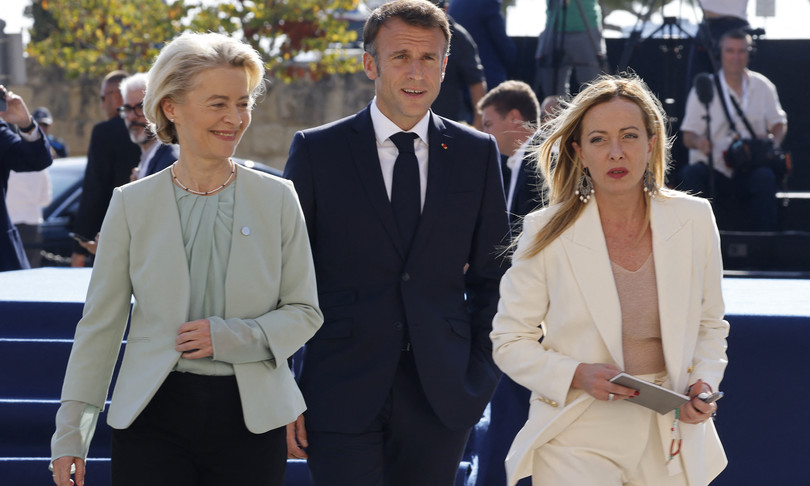
Giorgia Meloni’s Key Role in the Mediterranean
The meeting in Malta, in Valletta, on September 29th, involving all the Heads of State and Government of the MED9, the organization comprising European countries bordering the Mediterranean, witnessed an unexpected new alliance between Italy and France.
To begin with, it’s worth noting that relations between Italy and Germany have significantly cooled, if not broken off completely, due to controversies surrounding immigration. The rift began with the news that the German federal budget included funding for NGOs, contributing to the rescue of migrants but also their arrival, primarily on Italian shores. This news was followed by comments from the Deputy Secretary of the League (ID) who allegedly compared the Scholz government to Nazism, stating that during World War II, Germans invaded countries with their army, whereas today they do it with migrants.
This was a very serious accusation that was certainly not well-received in Berlin. Germany urgently needs to reach an agreement in Europe on immigration, the so-called Pact on Migration, which is primarily driven by social democrats (SPD in Germany and PSOE in Spain). This pact could become the cornerstone of the entire social situation related to immigration. It’s particularly critical for Scholz, as domestically, the government coalition stands at 37%, with the SPD at less than 17%, the Greens below 15%, and the FDP at 6%. All this while the CDU/CSU coalition stands at 27% and is poised to win elections in Hesse and Bavaria. The second-largest party at the national level appears to be the AfD, which has surpassed the 20% mark in polls.
Italian Prime Minister Giorgia Meloni wasted no time addressing this situation. She reiterated how funding for NGOs undermines the work carried out in the first year of her government to establish bilateral relationships with countries of origin. These relationships aim to safeguard not only the lives of migrants but also the stability of host countries.
Thus, the EuroMED9 meeting, featuring Italy, France, Spain, Portugal, Greece, Cyprus, Malta, Slovenia, and Croatia, becomes a critical platform for challenging Germany and strengthening Italy’s position in the Mediterranean. To achieve this, Meloni needed a strong counterpart. Since it wasn’t feasible to directly engage with the Spanish, who are closely aligned with the Germans, the Italian Prime Minister decided to have a one-on-one conversation with Emmanuel Macron, ending nearly a year of hostility. This meeting resulted in a two-fold plan: Meloni sent a communication to the President of the European Commission, Ursula von der Leyen, reaffirming the importance of bilateral work with African countries and expressing readiness for a multilevel European plan. Meanwhile, Macron presented a proposal at the EuroMED9 meeting, coordinated with Meloni, to send a clear message about the need for European involvement.
The EuroMED9 meeting emphasized the need to strengthen relationships with southern neighbor partners and reaffirmed Europe’s commitment to combating irregular immigration by increasing European efforts to reduce primary movements and thus prevent departures – a stance Giorgia Meloni has advocated since her first day in office.
 However, the challenge lies in dealing with France, Italy’s ally. It’s clear that France may not view favorably Italy essentially appropriating bilateral relationships with African countries such as Tunisia or Egypt, thereby undermining France’s role as a European power of reference for the continent. Moreover, China’s growing presence in sub-Saharan eastern Africa (such as Ethiopia) and the volatile situation in sub-Saharan western Africa, which has warned that a French or ECOWAS intervention would be considered hostile after the coup in Niger, indicate that a new power managing these relationships could safeguard many economic interests at the expense of geopolitical power.
However, the challenge lies in dealing with France, Italy’s ally. It’s clear that France may not view favorably Italy essentially appropriating bilateral relationships with African countries such as Tunisia or Egypt, thereby undermining France’s role as a European power of reference for the continent. Moreover, China’s growing presence in sub-Saharan eastern Africa (such as Ethiopia) and the volatile situation in sub-Saharan western Africa, which has warned that a French or ECOWAS intervention would be considered hostile after the coup in Niger, indicate that a new power managing these relationships could safeguard many economic interests at the expense of geopolitical power.
While Italy’s alliance with France is crucial to counter Germany’s funding of NGOs, it opens up a potential issue for the future. It’s no secret that Macron leads Renew Europe, the centrist and liberal European movement. Certainly, to disrupt the balance of power currently held by the People’s Party, the Socialists, and other political formations, the entry of liberals is necessary. However, it’s equally true that firstly, a majority of PPE-ECR-RE may not be enough to govern, and secondly, Macron could raise the stakes in such a scenario, given his pivotal role.
Beyond these considerations, Giorgia Meloni’s idea of promoting African development to limit departures seems, at present, to be the most appreciated solution, at least by governments bordering the Mediterranean. The future of the Meloni government and the European Union hinges on this issue.



 Subscribe
Subscribe